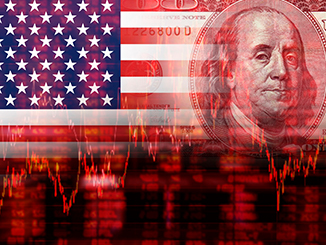In the aftermath of World War II, the United States was not just a military superpower but also an economic superpower. As the world’s largest economy and with the dollar being established as the world’s reserve currency, the US government had no qualms about taking advantage of that position. Even in the aftermath of the breakdown of the Bretton Woods system and the closing of the gold window the US dollar remained the world’s reserve currency. But decades of devaluation and abuse of the dollar’s reserve status have led to increasing unease about the dollar’s future course.
Adding to that unease is the fact that the US government has fully weaponized the American financial system. With the dollar still the world’s reserve currency and a vital currency in markets such as oil, and the US banking system still the world’s most dominant, companies and countries that want to do international business find themselves almost of necessity having to deal with the American financial system. The US government has taken advantage of that fact by levying sanctions against individuals and corporations in Russia, Iran, and other countries it wants to punish and forbidding them from being able to access the US financial system.
But that punishment doesn’t just extend to alleged bad actors in those countries. US sanctions also forbid other countries and their businesses from doing business with those bad actors lest they also face being cut off from the US financial system. That has rankled other countries, particularly in the European Union. Unlike the US, EU countries have a history of doing business in Iran. The start-stop nature of US sanctions, slapping sanctions on Iran then removing them then enacting them again, has European companies frustrated. And the EU is equally frustrated that its companies are facing being cut off from the US and world financial system.
That’s why the EU has decided to start looking at creating its own payment system that would not rely on the US. By creating its own payment system, including perhaps a version of the SWIFT system that would be outside US influence, EU banks could continue to do business around the world without having to worry about what the US government thinks. If such a system were to be established, it would essentially sandbox the United States, minimizing US influence and rendering the US financial system increasingly irrelevant.
That in turn would mark the beginning of the end of the dollar’s international dominance. With an EU payments system that presumably would be euro-denominated, other countries would be able to dump the dollar and use the euro instead. And that would be bad news for American investors whose investments are dependent on the strength of the dollar.
Investors who want to protect against that possibility need to diversify their portfolios and begin investing in assets that don’t rely on the dollar’s strength for their value. Gold is one of those assets, as it is a universal store of value that not only won’t lose value when the dollar plummets but actually gains value as the dollar weakens. Those investors who can see the writing on the wall and move to protect themselves against the dollar’s eventual decline will make out far better than those who don’t.
This article was originally posted on Goldco.




